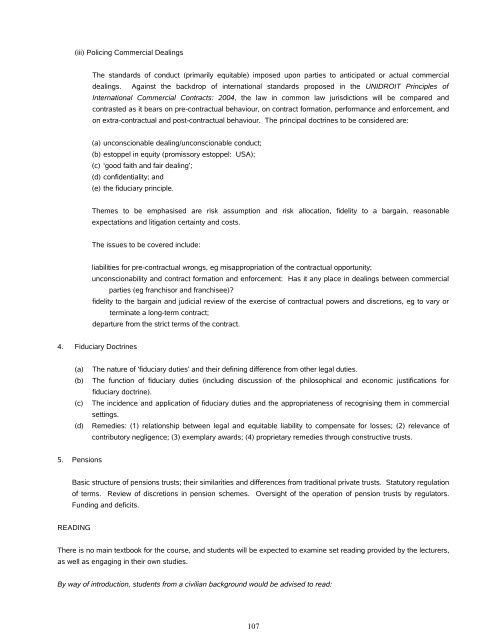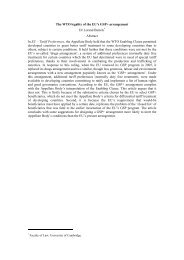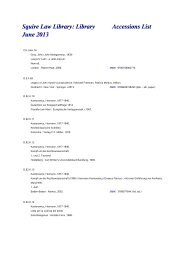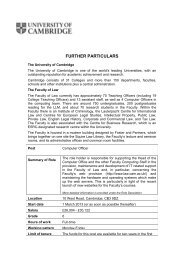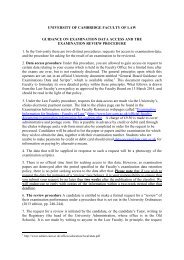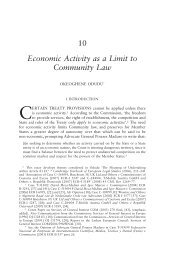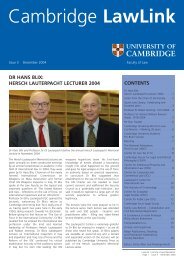Reiman, ‘Justice, Civilization, and the Death Penalty’Sorell, Moral Theory and Capital PunishmentSteiker, ‘No, Capital Punishment is not Morally Required’Sunstein and Vermeule, ‘Is Capital Punishment Morally Required?’van den Haag, ‘The Ultimate Punishment: A Defense’van den Haag and Conrad, The Death PenaltyWaldron, ‘Lex Talionis’The Obligation to Obey the <strong>Law</strong>:Gans, Philosophical Anarchism and Political DisobedienceGreen, The Authority <strong>of</strong> the StateGreenawalt, Conflicts <strong>of</strong> <strong>Law</strong> and MoralityHarris (ed), On Political ObligationHobbes, LeviathanHorton, Political ObligationHurd, Moral CombatKlosko, The Principle <strong>of</strong> Fairness and Political ObligationKramer, In Defense <strong>of</strong> Legal PositivismLocke, Second Treatise <strong>of</strong> GovernmentRaz, The Authority <strong>of</strong> <strong>Law</strong>Simmons, Moral Principles and Political ObligationsSoper, A Theory <strong>of</strong> <strong>Law</strong>PAPER 32. COMMERCIAL EQUITY1. Core Principles <strong>of</strong> Express Trusts and their ‘Offshore Challenge’(i)The juridical nature and function <strong>of</strong> the trust; trusts in organisational theory, including competing governancestructures for asset management through corporations and agency.Proprietary vs. contractarian aspects <strong>of</strong> trust. The relevance <strong>of</strong> default rules and the express drafting <strong>of</strong> trustterms. A discussion <strong>of</strong> which mandatory rules flow from which aspect.2. The ‘Irreducible Core’ <strong>of</strong> Trusteeship and Public Policy Controls on the Operation <strong>of</strong> Trusts(ii)The possibility <strong>of</strong> an ‘irreducible core’ content <strong>of</strong> trusteeship in English law (in terms <strong>of</strong> duties to account and toact in good faith; supervision by a court; enforcement by beneficiaries and limits on duration by the rule againstperpetuities).The extent to which these can be abrogated in England by exemption clauses and ousters <strong>of</strong> rights toinformation.The basis <strong>of</strong> rights to information in English and Commonwealth law, including access to letters <strong>of</strong> wishes.The adequacy <strong>of</strong> the rights. Implications for trustee accountability and beneficiary enforcement.3. Equitable Regulation in a Commercial Context106
(iii) Policing Commercial DealingsThe standards <strong>of</strong> conduct (primarily equitable) imposed upon parties to anticipated or actual commercialdealings. Against the backdrop <strong>of</strong> international standards proposed in the UNIDROIT Principles <strong>of</strong>International Commercial Contracts: 2004, the law in common law jurisdictions will be compared andcontrasted as it bears on pre-contractual behaviour, on contract formation, performance and enforcement, andon extra-contractual and post-contractual behaviour. The principal doctrines to be considered are:(a) unconscionable dealing/unconscionable conduct;(b) estoppel in equity (promissory estoppel: USA);(c) ‘good faith and fair dealing’;(d) confidentiality; and(e) the fiduciary principle.Themes to be emphasised are risk assumption and risk allocation, fidelity to a bargain, reasonableexpectations and litigation certainty and costs.The issues to be covered include:liabilities for pre-contractual wrongs, eg misappropriation <strong>of</strong> the contractual opportunity;unconscionability and contract formation and enforcement: Has it any place in dealings between commercialparties (eg franchisor and franchisee)?fidelity to the bargain and judicial review <strong>of</strong> the exercise <strong>of</strong> contractual powers and discretions, eg to vary orterminate a long-term contract;departure from the strict terms <strong>of</strong> the contract.4. Fiduciary Doctrines(a)(b)(c)(d)The nature <strong>of</strong> ‘fiduciary duties’ and their defining difference from other legal duties.The function <strong>of</strong> fiduciary duties (including discussion <strong>of</strong> the philosophical and economic justifications forfiduciary doctrine).The incidence and application <strong>of</strong> fiduciary duties and the appropriateness <strong>of</strong> recognising them in commercialsettings.Remedies: (1) relationship between legal and equitable liability to compensate for losses; (2) relevance <strong>of</strong>contributory negligence; (3) exemplary awards; (4) proprietary remedies through constructive trusts.5. PensionsBasic structure <strong>of</strong> pensions trusts; their similarities and differences from traditional private trusts. Statutory regulation<strong>of</strong> terms. Review <strong>of</strong> discretions in pension schemes. Oversight <strong>of</strong> the operation <strong>of</strong> pension trusts by regulators.Funding and deficits.READINGThere is no main textbook for the course, and students will be expected to examine set reading provided by the lecturers,as well as engaging in their own studies.By way <strong>of</strong> introduction, students from a civilian background would be advised to read:107
- Page 2 and 3:
ContentsGeneral InformationOfficers
- Page 4 and 5:
Settlement of International Dispute
- Page 6 and 7:
Faculty AdministrationFaculty Offic
- Page 8 and 9:
The Faculty of LawLaw has been stud
- Page 10 and 11:
The LLM Degree. This degree is awar
- Page 12 and 13:
Opening Hours:Full Term: Monday to
- Page 14 and 15:
Rules Made by the Information Strat
- Page 16 and 17:
The Lauterpacht Centre for Internat
- Page 18 and 19:
Centre for Corporate and Commercial
- Page 20 and 21:
Cambridge Socio-Legal GroupThe Camb
- Page 26 and 27:
Dates of Faculty Board Meetings7 Oc
- Page 28 and 29:
Proceed with caution in reaching fo
- Page 30 and 31:
Faculty CommunicationEach year, the
- Page 32 and 33:
Law Tripos Part IA. A candidate for
- Page 34 and 35:
Prizes. The following prizes may be
- Page 36 and 37:
PAPER 2. CONSTITUTIONAL LAWA. The a
- Page 38 and 39:
Oliver, Constitutional Reform (2003
- Page 40 and 41:
Hedley, Tort (6th ed 2008)Weir, An
- Page 42 and 43:
3. Trusts and co-ownership: Concurr
- Page 44 and 45:
Brownlie, Principles of Internation
- Page 46 and 47:
Elliott, Constitutional Foundations
- Page 48 and 49:
Contract: covenant and debt; assump
- Page 50 and 51:
Statutes:Blackstone’s Statutes on
- Page 52 and 53:
For reference:Birks and Pretto (ed)
- Page 54 and 55:
Foster, EU Legislation (2010-2011)B
- Page 56 and 57: PAPER 42. INTELLECTUAL PROPERTY1. I
- Page 58 and 59: 2. Property torts (conversion and t
- Page 60 and 61: (iii)Causation4. Contracts in Engla
- Page 62 and 63: Rawls, Political LiberalismRawls, J
- Page 64 and 65: Rodger and McCulloch, The UK Compet
- Page 66 and 67: Law Commission, Renting Homes: The
- Page 68 and 69: Human Rights Case DigestHuman Right
- Page 70 and 71: 3. Title at common law and in equit
- Page 72 and 73: Exemption from Professional Examina
- Page 74 and 75: Paper application available to down
- Page 76 and 77: Form of Examination and Designation
- Page 78 and 79: ‘Open Book’ Papers. Where a pap
- Page 80 and 81: LLM : Syllabuses and Lists of Recom
- Page 82 and 83: ased upon one or two leading cases,
- Page 84 and 85: Goff and Jones, The Law of Restitut
- Page 86 and 87: Butterworths’ Company Law Handboo
- Page 88 and 89: 2. The EU’s system for human righ
- Page 90 and 91: the context of environmental protec
- Page 92 and 93: European Competition Law Review (EC
- Page 94 and 95: Crawford, The Treatment of Combatan
- Page 96 and 97: Douglas, The International Law of I
- Page 98 and 99: Unger, Free Trade Reimagined (2007)
- Page 100 and 101: 3. Sceptics and Critics I4. Sceptic
- Page 102 and 103: The course provides an opportunity
- Page 104 and 105: (iv)(v)(vi)(vii)Is either utilitari
- Page 108 and 109: Gardner, Introduction to the Law of
- Page 110 and 111: 1. Types of theoretical analysis an
- Page 112 and 113: 2. Specific fieldsTopics to be sele
- Page 114 and 115: The LLM (one-year taught postgradua
- Page 116 and 117: As part of the requirements for the
- Page 118 and 119: Teaching Members of the Faculty of
- Page 120 and 121: MC Elliott, MA, PhD (Cantab); St Ca
- Page 122 and 123: RA Melikan, BA (Mich), JD, MA (Chi)
- Page 124 and 125: BD Sloan, MA, LLM (Cantab); King’
- Page 126 and 127: Law Teachers in the Department of L
- Page 128 and 129: Murray Edwards College. Dr S Turenn


